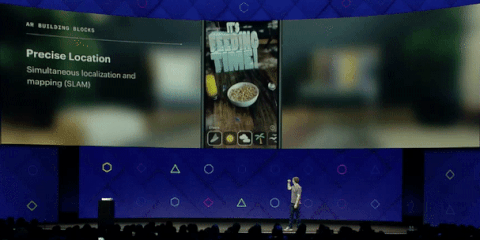Facebook Just Previewed the Inescapable Ads of the Future

Today was the kickoff for F8, Facebook's annual developer conference and a platform for the social media behemoth to beat its chest a little and trot out its newest tricks. This year, augmented reality is the star of the show. But there's something simmering beneath the surface of Facebook's big push into AR. What's this is all really about is how the next generation of advertising will burrow deep into your online life, using everything you do and share as a vector for its spread.
During his keynote, Mark Zuckerberg offered up plenty of fun examples this tech would make possible. Use a face-tracking filter to add a silly mask to your selfie! Spice up that Instagram of your morning coffee with a second cartoon cup, or words that emerge directly from the table! Give your house an instant makeover by making it appear as if it were actually Hogwarts! But most importantly, do all this and then share it.
Facebook promises these tricks make things more "engaging" and "meaningful"
One presenter-perhaps by accident-summed up Facebook's pragmatic view of these tricks quite succinctly, saying they make what you share more "engaging" and "meaningful." Make more, share more, engage more. Zuckerberg explained this with a chilling frankness on stage:
We all do things like this everyday, like running, cleaning our home, doing the laundry, changing diapers. And the reality is we're proud of these things. We want to express them but we often don't get a chance to do that because they feel mundane. it doesn't feel special enough to share. So too often we don't share them unless we have something that makes that moment funny or feel like it's going to be relevant to other people. So as silly as effects like this might seem, they're actually really important and meaningful because they give us the ability to share what matters to us on a daily basis.
This social dogma is an ostensibly benign approach to boosting Facebook's first goal, which is to maintain a large, engaged base of users. But the end point of all this-monetizing those users-is where it starts to feel a little gross.
Here's the maxim to remember: If you're not paying for a product, then you are the product. Facebook, a free service, has only two real aims: to keep as many people using it as often as possible and to make it easy for advertisers to reach that audience as broadly or specifically as possible. In short, Facebook wants to keep you around and make it very easy for someone else to show you ads.

You can see the seeds of how AR tech aligns with these goals by looking at Snapchat, whose features Facebook has been co-opting lately and who has been using augmented reality filters to enhance selfies for a while now. In the library of filter options, you'll often find some promoted by a brand. A Super Bowl filter that adds a cascade of Gatorade! A Taco Bell filter that turns your head into a taco! Facebook is not on the bleeding edge of this technology, but the social media titan that is getting ready to dive in head first. Zuckerberg even tacitly acknowledge this on stage, referencing an augmented reality photograph of a room that could be "[filled with Skittles], because the future is delicious-I can't help it!"
There are already ads all over Facebook, and Twitter, and everywhere else, of course. Free services have to make money somehow. What is different about this potential AR future is that the ads won't necessarily sit alongside your posts and pictures, coupled but distinct and separate. Instead, they can worm their way directly inside, using your every post as a means to spread themselves further, like parasites in a host body. If Starbucks can colonize your coffee selfie with a silly AR filter, then it can tag along when your mom shares the post. What if the room being filled with Skittles was yours?
you don't just see the ads, you make the ads. You are the ads.
Following the acquisition of Oculus, Facebook owns some of the best reality-bending tech on the market and employs some of the finest minds in the industry. And while I'm sure it would love to continue selling headsets, it is not by nature a hardware business. Facebook is much more closely aligned with using that tech not only to target you with ads, but to get you to turn your own stuff into an ad by your own volition. Think about it: If Facebook were to slather your pictures in ads, users would revolt. But if it can convince you to do it yourself...
This glimpse into the future can vary from no big deal to viscerally horrifying. It depends how bothered you are by pervasive advertising that tracks you and your every web search, versus how much you enjoy using services like Facebook for free. However you feel about it, Facebook's endgame seems pretty clear: In the future you don't just see the ads, you make the ads. You are the ads.
You Might Also Like

 Yahoo News
Yahoo News 
